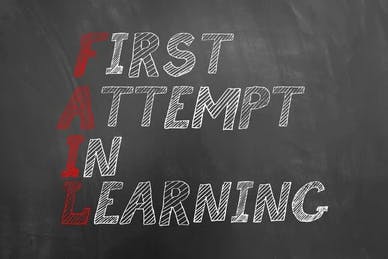Your cart is currently empty!
Failure: how do you take the repeated blows you experience running a business and keep on going?

Hello Reader,
I’ve had several businesses: I owned a steadicam; I was a media and PR consultant and an independent translator. I’ve had a psychotherapy practice and a holistic clinic.
Only two were what would be called successful by objective standards.
How do you take these kinds of repeated blows and keep on going?
How do you shift the story from “I’m a failure” to something more empowering?
There are a couple of strategies that can serve you well: not taking things personally and learning from your mistakes.
I know, I know, those are such clichés. I’m sure you’re rolling your eyes. They evoke the same reaction in me, as clichés… AND when you turn them into practices, they can be very powerful.
Don’t take failure personally
One of the factors that make entrepreneurs vulnerable to mental health challenges is the entrepreneur’s tendency to tie their identity and sense of self-worth to external assessments of success.
When things are going well, we can tell ourselves good things about ourselves, but when they’re going badly, we take it to mean there is something wrong with us.
We say things to ourselves like, “I’m a terrible entrepreneur.” “I’m a fuck-up.” “I can’t do anything right.
This is “taking things personally.”
“Don’t take it personally” means that whatever is happening is not a moral judgement on you as a human being.
When your business becomes your whole self and something goes wrong, it makes you vulnerable to a painful crisis of identity… and in business things often go wrong.
Believing there is something wrong with you, or something bad about you as a person, when in fact it’s a hitch in business and attributable to many factors, only increases your distress.
Stress affects cognition–your thinking and reasoning skills. When your distress is high, it makes it even more difficult to gather your thoughts, access your creativity and problem-solving skills.
When you understand yourself as separate from your business, and as a human being with value apart from your successes and failures, you can build a more balanced sense of identity on which you can rely when you are stressed.
Take time to notice the things you’re saying to yourself, and the meaning you are attributing to what’s happening.
For example, the fact may be that your bank account is overdrawn. The meaning you may be attributing to that is, “I’m shitty with money because I can’t cover my bills.” or “I’m a terrible business person because I have no clients.”
Unpacking the facts and differentiating them from the meaning you are attributing to them can make a big difference in your mental health.
It’s easier said than done, and is a process that needs to be repeated over and over again.
It helps a lot to journal on it, or to do it in conversation with someone supportive, like your biz bestie, your coach or therapist.
How to “fail forward” and learn from your mistakes
Failure in itself does not have to be a catastrophe. However, failing to learn from your failure is definitely a missed opportunity.
Finding the lessons in failure is what you could call a hindsight practice. Here’s a worksheet to support you in working through the process I outline here.
With the perspective of time, you can look back and identify what strengths and skills you brought to the situation.
Then ask yourself how those strengths and skills improved. Maybe you learned some new skills as well.
You can also be curious about what new information you gained in the course of the failure.
You might like to consider this “failure” an iteration rather than an endpoint.
Think about how that will inform what you’re doing now or what you will do next time you encounter this problem or something similar—or even a new problem.
It helps reinforce this mindset shift to share it with others. When you choose to tell a story that demonstrates you’re the kind of person who brings your strengths to challenges, this sense of yourself will serve you well as a motivator when you hit future bumps in the road.
An additional benefit of telling your story of resilience: it helps others. It introduces the idea that they too can look at failure differently, and become stronger and more skilled as a result.
Would you like some support to implement these practices in your life? Learn more about working with me.
In gratitude,
|
|